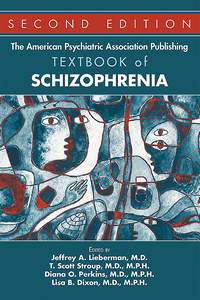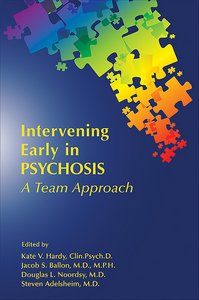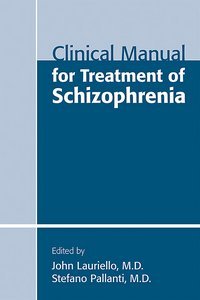The American Psychiatric Association Publishing Textbook of Schizophrenia, Second Edition
View Pricing
Description
The new edition of The American Psychiatric Association Publishing Textbook of Schizophrenia plumbs the current state of knowledge about the disorder's origin, nature, and treatment in a comprehensive, authoritative, and thoroughly revised text. Schizophrenia is one of the leading causes of disability worldwide and remains among the most challenging and disheartening disorders confronting psychiatrists and other mental health care providers because of its profound effects on patient functioning, its onset just as young adults are launching their lives, and the limitations of current pharmacological treatments. Designed to bring the reader up to date on the latest research, this new edition represents a complete overhaul of the previous text, with a new structure, new chapters, and new contributors. Subjects such as genetics and neurobiology, distinguished by rapid advancements in knowledge, are explored in depth, as are new models of service delivery and psychosocial treatments that are making a significant difference in patients' lives. Foundational information on the epidemiology, etiology, and psychopathology of the illness is presented clearly and cogently, emphasizing research conducted over the last decade. Theories regarding the pathophysiological basis of the disorder, including genetic, molecular, and neurocircuitry models, are examined in detail.
Other noteworthy topics include:
- Cultural variations, examining how culture influences the presentation of schizophrenia from the perspective of the experts in cultural psychiatry who developed the DSM-5 Cultural Formulation Interview
- Service delivery models, including assertive community treatment, critical time intervention, coordinated specialty care for early psychosis, and integrated dual diagnosis, informing clinicians about options for providing treatment to individuals with schizophrenia
- Advances in the existing pharmacological treatments, including use of adjunctive medications and combinations of antipsychotics, which, in the absence of new drug therapies, is indispensable knowledge
- A review of the promising field of neuromodulation
- Evaluation and treatment of comorbidities, such as depression, obsessive-compulsive disorder, and substance use disorders, vital information because over half of people with schizophrenia have at least one co-occurring behavioral health disorder
- Individual- and family-centered care, which presents the rationale and evidence for actively involving patients and family members in interventions and decision-making about treatments
Designed for ease of use, The American Psychiatric Association Publishing Textbook of Schizophrenia furnishes evidence-based and cutting-edge knowledge for the next generation of students, trainees, and clinicians.
Contents
- Part I Presentation of Schizophrenia
- Chapter 1. Epidemiology
- Chapter 2. Natural History
- Chapter 3. Psychopathology
- Chapter 4. Cultural Variations
- Part II Etiology and Pathophysiology
- Chapter 5. Causes
- Chapter 6. Pathophysiological Theories
- Chapter 7. Neurobiology
- Part III Treatment and Rehabilitative Therapies
- Chapter 8. Pharmacological and Somatic Therapies
- Chapter 9. Psychosocial and Rehabilitative Therapies
- Chapter 10. Co-occurring Disorders and Conditions
- Chapter 11. Evidence-Based Models of Service Delivery
- Chapter 12. Person- and Family-Centered Care
- Index
Contributors
- Neil Krishan Aggarwal, M.D., M.B.A., M.A.
Melanie Bennett, Ph.D.
Mary F. Brunette, M.D.
Michael T. Compton, M.D., M.P.H.
Lisa B. Dixon, M.D., M.P.H.
Michael B. First, M.D.
James E. Gangwisch, Ph.D.
Donald C. Goff, M.D.
Paul Grant, Ph.D.
L. Fredrik Jarskog, M.D.
Daniel C. Javitt, M.D.
Nev Jones, Ph.D.
Matcheri S. Keshavan, M.D.
Steve Koh, M.D.
Ryan E. Lawrence, M.D.
Roberto Lewis-Fernandez, M.D., M.T.S.
Julio Licinio, M.D., Ph.D.
Jeffrey A. Lieberman, M.D.
Paulo L. Lizano, M.D., Ph.D.
Marc W. Manseau, M.D., M.P.H.
Stephanie Martinez, M.D.
Alice Medalia, Ph.D.
Bernardo Ng, M.D., DFAPA
Diana O. Perkins, M.D., M.P.H.
Seth W. Perry, Ph.D.
Konasale M. Prasad, M.D.
Sarah Pratt, Ph.D.
Alice Saperstein, Ph.D.
T. Scott Stroup, M.D., M.P.H.
Mauricio Tohen, M.D., Dr.P.H., M.B.A.
T. Wilson Woo, M.D., Ph.D.
Michael B. First, M.D
L. Fredrik Jarskog, M.D.
Matcheri S. Keshavan, M.D.
Alice Medalia, Ph.D
Diana O. Perkins, M.D., M.P.H.
Alice Saperstein, Ph.D.
T. Scott Stroup, M.D., M.P.H.
About the Authors
Jeffrey A. Lieberman, M.D., is Lawrence C. Kolb Professor and Chairman of Psychiatry at Columbia University Vagelos College of Physicians and Surgeons; Director of the New York State Psychiatric Institute; and Psychiatrist-in-Chief at the NewYork-Presbyterian Hospital-Columbia University Irving Medical Center in New York, New York.
T. Scott Stroup, M.D., M.P.H., is Professor of Psychiatry and Vice Chair for Academic Affairs and Faculty Development in the Department of Psychiatry at Columbia University Vagelos College of Physicians and Surgeons in New York, New York.
Diana O. Perkins, M.D., M.P.H., is a Professor in the Department of Psychiatry at the University of North Carolina School of Medicine in Chapel Hill, North Carolina.
Lisa B. Dixon, M.D., M.P.H., is Edna L. Edison Professor of Psychiatry at Columbia University Vagelos College of Physicians and Surgeons and Director of the Division of Behavioral Health Services and Policy Research and Center for Practice Innovations at the New York State Psychiatric Institute in New York, New York.
Related Products
Carousel Control - items will scroll by tabbing through them, otherwise arrows can be used to scroll one item at a time








